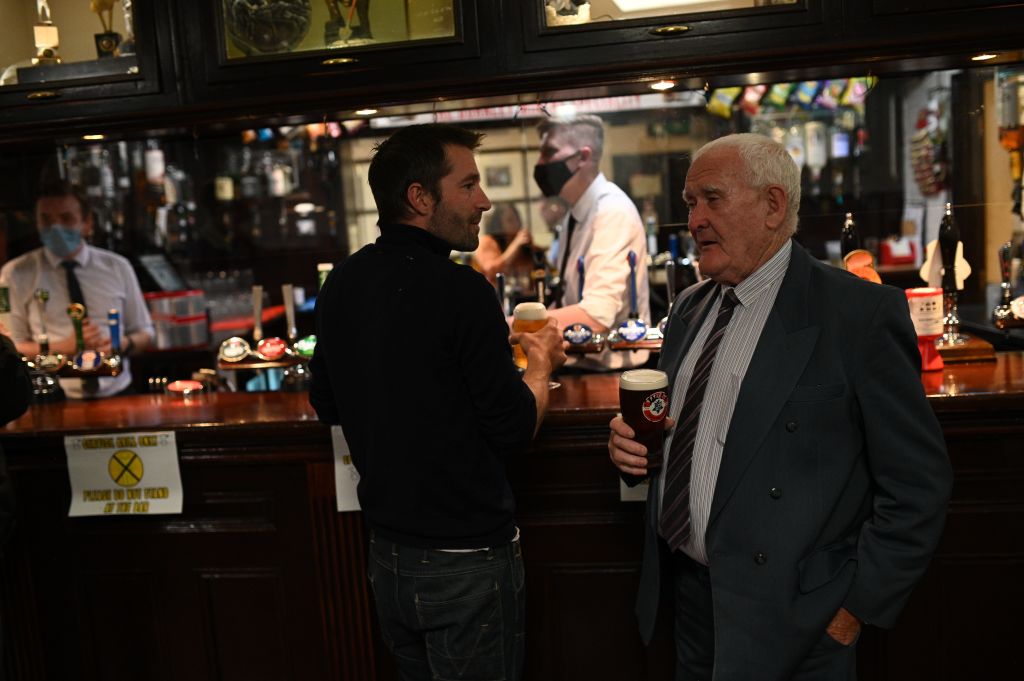COVID-19 can possibly spread through airborne aerosols, definitely via people without symptoms, WHO says


A free daily email with the biggest news stories of the day – and the best features from TheWeek.com
You are now subscribed
Your newsletter sign-up was successful
The World Health Organization updated its findings Thursday on how COVID-19 is transmitted, and there are two important changes. First, the WHO acknowledged growing evidence the new coronavirus may spread through aerosols, tiny droplets of saliva that linger in the air for hours, especially in enclosed and poorly ventilated spaces. The second change involved the risk of transmission by people who don't have symptoms. Both issues have broad implications for how to contain the disease.
The WHO maintains that the main route of transmission involves infected people projecting saliva droplets into the eyes, mouth, or nose of people in close proximity, via coughing, sneezing, talking, or singing. The agency also said spread through infected surfaces, or formite transmission, is "likely" though not yet proven. Urine and feces have been shown to contain viable amount of the new coronavirus, too.
The virus can be spread by people who don't have COVID-19 symptoms, the WHO said, but there is an "important" distinction between people who never develop symptoms (asymptomatic) and those who have yet to develop symptoms (presymptomatic), and "the extent of truly asymptomatic infection in the community remains unknown." As a practical matter, Michael Barbaro noted on Thursday's The Daily podcast, the WHO is "making distinctions that don't mean all that much to people who are trying to decide whether to go to work, whether to go to a restaurant, whether to see friends."
The Week
Escape your echo chamber. Get the facts behind the news, plus analysis from multiple perspectives.

Sign up for The Week's Free Newsletters
From our morning news briefing to a weekly Good News Newsletter, get the best of The Week delivered directly to your inbox.
From our morning news briefing to a weekly Good News Newsletter, get the best of The Week delivered directly to your inbox.
The WHO has long dismissed aerosols as a means of transmission except during certain medical procedures, but it now says airborne spread "cannot be ruled out." There's evidence aerosols may have been responsible for "outbreaks of COVID-19 reported in some closed settings, such as restaurants, nightclubs, places of worship, or places of work where people may be shouting, talking, or singing," the WHO said, though larger droplets or contaminated surfaces might also have caused those outbreaks.
"Outdoors, any virus in small or large droplets may be diluted too quickly in the air to pose a risk," The New York Times reports. "But even a small possibility of airborne spread indoors has enormous implications for how people should protect themselves." The new brief mostly shows the WHO's experts interpret the data on aerosols differently, Oxford University's Dr. Trish Greenhalgh tells the Times. "The push-pull of that committee is palpable," she said. "As everyone knows, if you ask a committee to design a horse, you get a camel."
A free daily email with the biggest news stories of the day – and the best features from TheWeek.com
Peter has worked as a news and culture writer and editor at The Week since the site's launch in 2008. He covers politics, world affairs, religion and cultural currents. His journalism career began as a copy editor at a financial newswire and has included editorial positions at The New York Times Magazine, Facts on File, and Oregon State University.
-
 Political cartoons for February 16
Political cartoons for February 16Cartoons Monday’s political cartoons include President's Day, a valentine from the Epstein files, and more
-
 Regent Hong Kong: a tranquil haven with a prime waterfront spot
Regent Hong Kong: a tranquil haven with a prime waterfront spotThe Week Recommends The trendy hotel recently underwent an extensive two-year revamp
-
 The problem with diagnosing profound autism
The problem with diagnosing profound autismThe Explainer Experts are reconsidering the idea of autism as a spectrum, which could impact diagnoses and policy making for the condition
-
 TikTok secures deal to remain in US
TikTok secures deal to remain in USSpeed Read ByteDance will form a US version of the popular video-sharing platform
-
 Unemployment rate ticks up amid fall job losses
Unemployment rate ticks up amid fall job lossesSpeed Read Data released by the Commerce Department indicates ‘one of the weakest American labor markets in years’
-
 US mints final penny after 232-year run
US mints final penny after 232-year runSpeed Read Production of the one-cent coin has ended
-
 Warner Bros. explores sale amid Paramount bids
Warner Bros. explores sale amid Paramount bidsSpeed Read The media giant, home to HBO and DC Studios, has received interest from multiple buying parties
-
 Gold tops $4K per ounce, signaling financial unease
Gold tops $4K per ounce, signaling financial uneaseSpeed Read Investors are worried about President Donald Trump’s trade war
-
 Electronic Arts to go private in record $55B deal
Electronic Arts to go private in record $55B dealspeed read The video game giant is behind ‘The Sims’ and ‘Madden NFL’
-
 New York court tosses Trump's $500M fraud fine
New York court tosses Trump's $500M fraud fineSpeed Read A divided appeals court threw out a hefty penalty against President Trump for fraudulently inflating his wealth
-
 Trump said to seek government stake in Intel
Trump said to seek government stake in IntelSpeed Read The president and Intel CEO Lip-Bu Tan reportedly discussed the proposal at a recent meeting
